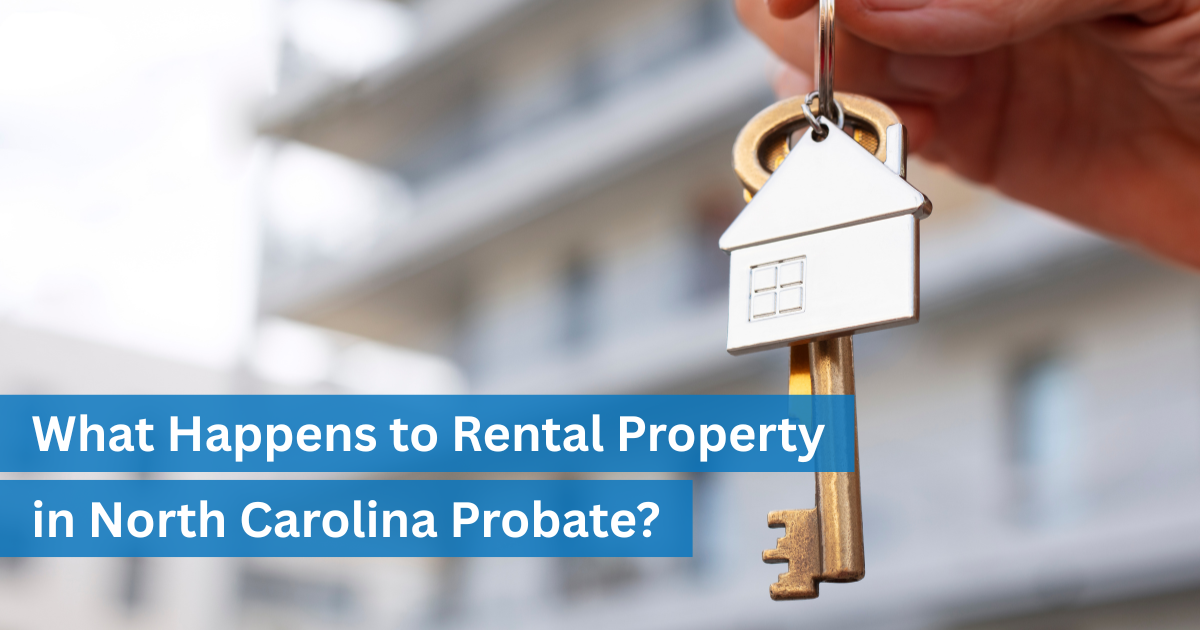
What Happens to Rental Property in North Carolina Probate?
Probating an estate in North Carolina is always a detailed process but when rental properties are part of the estate, things become more complex. These properties may generate income, carry mortgages or HOA dues, and involve tenants who have rights under state law. The personal representative (called the executor if there is a will, or the administrator if there is no will) must balance both the legal side of probate and the practical realities of managing rental property.
This article explains how North Carolina probate law treats rental properties, what steps are required, and the common problems to look out for.
How Rental Property Ownership Transfers After Death in North Carolina
Probate in North Carolina is overseen by the Clerk of Superior Court in the county where the deceased lived. The personal representative must safeguard estate assets, including rental properties, collecting rent, paying bills, and keeping properties habitable until they are sold or transferred.
Real estate passes immediately at death to heirs (if no will) or to devisees (those named in the will). However, property remains subject to estate debts. If the estate lacks cash, the executor can petition the Clerk to bring the property into the estate and even sell it to pay creditors.
North Carolina landlord-tenant law continues to apply: leases don’t automatically end at the landlord’s death, and tenants keep their rights unless a court orders otherwise.
Key Steps in Handling a Rental Property During Probate in NC
- Open the estate. The executor files the will (if any) and applies for “Letters” (documents which give legal authority to act) from the Clerk.
- Decide if the property is part of the estate. In North Carolina, real estate usually passes outside probate. That means heirs, not the estate, collect post-death rent and pay expenses, unless the executor formally pulls the property into the estate to cover debts.
- Notify creditors. The executor publishes notice and mails it to known creditors, who have 90 days to file claims. Debts must be paid in order of priority (funeral and court costs first, credit cards last). Paying the wrong debts too soon can make the executor personally liable.
- Secure and insure. Vacant rentals may need locks changed and insurance converted to a vacancy or estate policy. Mortgage lenders, HOAs, and condo associations should also be notified.
- Value the property. The executor files an inventory listing real estate at fair market value, based on an appraisal or realtor market analysis.
- Manage rent and expenses. If the property is in the estate, rent goes into the estate account and the estate pays bills. If not, heirs handle both. Mixing these up can create accounting problems.
- Handle tenant matters. Leases remain valid. The executor or heirs must keep the property habitable and transfer or return security deposits within 30 days, with written notice. If a tenant dies and no representative is appointed within 90 days, landlords can use a simplified affidavit process to take possession instead of filing an eviction.
- Sell if needed. If debts require it, the executor can petition the Clerk to approve a sale. North Carolina’s “upset bid” process allows higher offers within 10-day windows, which can delay closing but helps ensure a fair price.
- Address liens and dues. Unpaid HOA or condo assessments can lead to liens and even foreclosure. These must be handled during probate or at closing.
- File taxes. If the estate earns $600 or more in income, the executor must obtain an EIN and file IRS Form 1041. Heirs get a “step-up in basis,” which resets the property’s tax basis to its fair market value at death, reducing future capital gains taxes.
Taxes and Accounting with Inherited Rental Properties in NC
If an estate earns $600 or more in income, the executor must file IRS Form 1041.
Heirs also benefit from the “step-up in basis.” This means the property’s tax basis resets to its fair market value at the date of death. For example, if a rental was bought years ago for $100,000 and is worth $400,000 at death, heirs inherit it at $400,000. If they sell right away, they may owe little or no capital gains tax. If they wait too long, the value could increase along with the capital gains tax. And if they keep renting it, they should update depreciation schedules to reflect the new basis.
Why North Carolina Probate with Rental Property Often Takes Longer
Probate in North Carolina almost always moves slower when the estate includes rental property. Long-term leases can tie up a house or duplex and delay a sale until the lease ends or a buyout is negotiated. Rentals may need repairs before they can be marketed at fair value.
Heirs may disagree whether to keep the property or sell it. If the estate lacks cash, the executor may have to petition the Clerk of Superior Court for permission to sell. Even once approved, sales go through North Carolina’s upset bid process, where other buyers can raise the price in 10-day windows. This protects the estate from underselling but can extend closing for weeks or months.
Common Problems with Inherited Rentals in Probate
Tenants sometimes stop paying rent after a landlord dies if they don’t know who to pay. Vacant rentals may lose insurance coverage after 30–60 days unless switched to a vacancy policy. Unpaid HOA or condo dues can lead to liens or foreclosure.
Confusion about rent is another pitfall. In NC, rent after death belongs to heirs unless the executor formally brings the property into the estate. Using estate funds for taxes or repairs on property which has already passed to heirs can create accounting problems with the personal representative.
Other recurring issues include mishandled security deposits. Carolina law requires that deposits be transferred to the new landlord or refunded within 30 days, with written notice to tenants. Failure to follow the Security Deposit Act can lead to penalties and lawsuits.
Mortgages often worry families, but federal law provides protection, barring lenders from calling a loan due when property passes at death to a relative or heir. The mortgage still must be paid, but heirs cannot be forced to pay it off immediately just because of inheritance. Problems usually arise when banks demand documents or send payoff letters or refuse to accept payment until heirs provide proof of death and ownership.
Other advanced issues sometimes crop up. Section 8 and other HUD-voucher rentals require notifying the housing authority, or payments may pause.
Finally, heirs who keep the property must follow normal landlord tax rules, including depreciation and passive activity limits. Without planning, these small details can add big delays.
How to Avoid Delays and Costs in NC Rental Property Probate
Executors can prevent many problems by acting quickly. Tenants should be told right away where to send rent, vacant homes need updated insurance, and HOA or condo dues must be paid on time to avoid liens. Security deposits must be handled within 30 days under North Carolina law. Executors should also wait until the 90-day creditor claim period ends before paying low-priority debts to avoid personal liability. When a sale is required, families should be prepared for the upset bid process, which may extend closing but usually brings a fairer market value.
Best Practices for Executors of North Carolina Estates with Rentals
Set up an estate bank account early and deposit any rent which legally belongs to the estate there. Confirm whether the rental property passes directly to heirs or is pulled into the estate, since that determines who pays expenses. Keep properties insured. Standard policies often limit coverage after 30–60 days of vacancy. Notify tenants in writing, manage deposits properly, and stay current on HOA assessments to avoid foreclosure risks. If a sale by the estate is likely, budget extra time for the state’s upset bid rules.
Legal Options to Simplify Inherited Rental Property in NC
Families can use settlement agreements to avoid disputes or arrange buyouts. If debts must be paid, the executor may petition the Clerk of Superior Court to sell the rental. If heirs cannot agree, a partition action may force a division or sale. Properties placed in a revocable trust before death usually bypass probate, while rentals owned through an LLC continue operating under the company with only the membership interest probated.
Frequently Asked Questions About Rental Properties in North Carolina Probate
Who owns a rental property on day 1 when the owner dies in North Carolina?
Title passes right away to heirs (no will) or devisees (named in the will), but the property is still subject to creditor claims and may be pulled into the estate if debts must be paid.
Can an executor sell a rental property to pay debts in probate?
Yes, usually with court approval unless the will clearly grants that power. Sales must follow NC’s judicial sale process and upset bid rules, which can extend closing but help get fair market value.
What happens to tenants and leases during probate?
Leases do not end when a landlord dies. The executor or heirs take over as landlord, and they must keep the property habitable, and handle security deposits under NC law.
Who pays the mortgage on a rental property in probate?
Heirs continue making payments. Federal law blocks lenders from demanding full payoff at death if the property transfers to relatives, though lenders may ask for proof.
Does a lease end when the landlord dies in North Carolina?
No. Leases stay in force, and rent must still be paid.
Who does rent belong to during probate in North Carolina? Can an executor collect rent from the decedent’s rental property?
Rent belongs to heirs unless the executor brings the property into the estate.
Do mortgages get called due when a rental property passes at death?
No. As long as payments continue, lenders cannot accelerate payoff just because of inheritance.
Are HOA or condo dues a problem during probate in North Carolina?
Yes. Unpaid assessments can result in liens or foreclosure, so dues must be paid until transfer or sale.
Conclusion
Probating a North Carolina estate with rental property is more complex than handling cash or personal belongings. Executors must manage tenants, leases, insurance, taxes, and creditor claims while following strict court procedures. Mistakes, like mishandling rent, deposits, or HOA dues, can create liability or costly delays.
For families, inheriting a rental home is not a simple handoff. With careful management, clear records, and professional help, probate can move forward without unnecessary expense or conflict.
You don’t have to figure this out alone. If you’re facing North Carolina probate with a rental property, book a free initial 15-minute consultation to get clarity on your next steps.

